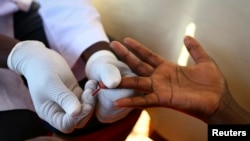Malawians have mixed reactions to government plans to introduce door-to door HIV testing early next year. Supporters say the step is urgently needed because 100 Malawians get infected each day, and an average of 138 die from AIDS daily. Minister of Health Jean Kalirani announced the plans during the recent commemoration of World AIDS Day in the northern district of Karonga.
“We will go in the villages asking for blood samples to check whether that person is HIV positive or not. And those that will be found HIV positive will definitely be given the care they need. And those who are found negative will also be counseled so that they remain negative,” said Kalirani.
Kalirani said the campaign will start in mid-March and will aim to reach everyone in the country, including people who are far from health facilities that provide HIV testing and counseling services. She said the campaign is in line with the goal of ending HIV infection by 2030. Malawi's HIV infection rate is currently at 10 percent, a slight drop from three years ago.
The announcement has raised fears in some Malawians, such as Steven Jailosi, a primary school teacher in rural Blantyre, who feel the campaign will likely infringe upon people’s privacy.
“I think it is not okay because they will be invading our privacy. HIV testing is supposed to be private. No one is supposed to know that I went for an HIV testing unless I make a choice to tell them,” said Jailosi.
Ester Makonokaya, a secretary in Blantyre, said that although she has been tested already, she feels the door-to-door HIV testing will violate people's privacy.
“Government should instead take the mobile clinics to the villages where people will be able to access them on their own rather than taking testing in their homes, because that might mean that some of the people who are not supposed to know other people’s status will know because, you know, when someone has been tested you show some reactions," said Makonokaya.
Macpherson Maulana, a journalist in Blantyre and a producer of radio programs on health, told VOA that government would do better to educate Malawians on the need for HIV testing so that people will go for tests on their own “without being pushed.”
“I fear it could end up into fights. You see it happened in Liberia recently where people who were coming to help people suspected to have contracted Ebola were even killed. So, civic education is the most important element for people to be encouraged to come out for testing voluntarily,” said Maulana.
However, HIV/AIDS counselor David Odali, whose NGO Umunthu Foundation runs HIV-related projects, insisted privacy will be protected.
“Confidentiality will be upheld. Let’s consider the household setup. I think the first thing would be to provide group counseling to members of that family. [Of course] people can be tested while others are watching, but when it comes to disclosing the results, a counselor is supposed to disclose that results to each and every individual separately,” said Odali.
Odali said it will be up to the person who has been tested to disclose his or her status.
In 2006, the charity Development Aid from People to People conducted door-to-door HIV testing in the district of Thyolo and Blantyre, reaching 400,000 people. The organization says it worked well.




